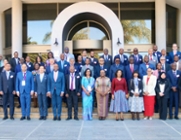Managing urbanisation in the Pacific

02 December 2016
Speaking at a Workshop on Implementation of the 2030 Agenda for Sustainable Development in Asian and Pacific Cities, organised by UNESCAP, CLGF Pacific Regional Director Karibaiti Taoaba looked at how the Pacific Urban Agenda ties in with the new Sustainable Development Goals (SDGs) agreed in 2015 and the New Urban Agenda agreed in Quito in November 2016.
Managing urbanisation and the consequences of urban growth continues to be a big challenge facing the Pacific island countries and communities, where rates of urban growth have outpaced those of rural growth. Informal settlements have become a dominant form of urban growth, and thus not factored in national urban plans or the provision of social services and infrastructure. Overcrowding on urban atolls with limited space is a huge challenge, as is the vulnerability to natural disasters.
The most recent Pacific Urban Agenda was agreed in 2015 at the fourth Pacific Urban Forum, jointly organised by CLGF Pacific and UN-Habitat, which particularly focused on sustainable urbanisation. Some of the issues highlighted included: integrated planning and strengthening urban linkages; peri-urban management; and inclusive, safe and resilient and sustainable cities and local authorities.
Now CLGF Pacific is hoping to establish a regional coalition of small island states (SIDS) on sustainable development to support and develop programme framework for implementing the New Pacific Urban Agenda. Also, through CLGF’s office and members in the Caribbean, CLGF Pacific is looking to work together with the Caribbean to establish a SIDS Urban Agenda.
The Workshop, which took place in Bangkok from 30 November -1 December 2016, brought together over 110 local and national government representatives and other key stakeholders to discuss the centrality of cities for achievement of the SDGs. Ms Taoaba told delegates how the recommendations of the Pacific Urban Forum have helped to influence other discussions including at Habitat III where the global New Urban Agenda was agreed.
“Managing urbanisation and the consequences of urban growth continues to be a big challenge facing the Pacific island countries and communities,” said Ms Taoaba
“The Pacific Urban Agenda is very important in the region as it is the only document developed for the Pacific by Pacific Islands that is addressing urbanisation challenges in the Pacific and is linked very closely to implementing the SDGs.
“Many of the priority areas highlighted in the Pacific Plan are also reflected in the New Urban Agenda,” she sasid. “However, achieving them is a huge challenge due to limited capacity and resources available in the region and within countries themselves.”
The Adoption and implementation of the New Pacific Urban Agenda is part of the regional effort to maintain the momentum of good progress that has been achieved thus far by Pacific island governments, local authorities, development partners and other stakeholders in improving the management of urbanisation in the region by raising awareness of pressing concerns.”
Ms Taoaba said that the Pacific Urban Agenda with be submitted to the Pacific Island Forum States for inclusion in the Pacific priorities for 2017, so that some financial support may be forthcoming.
Back to News





